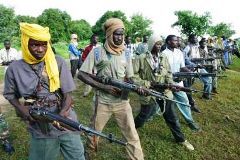Renewed fighting reported in South Darfur
NAIROBI, Sep 29, 2004 (IRIN) — Renewed fighting in South Darfur State has
reportedly driven at least 5,000 people from their homes in the last three
days, non-governmental organisations operating in the area said on
Tuesday. The displaced, they added, were now seeking shelter under trees
and waiting without food, water or shelter.
 It was not however possible to confirm who was fighting who, Martha
It was not however possible to confirm who was fighting who, Martha
Clarke, head of public relations for Action by Churches Together
(ACT)/Caritas, told IRIN.
“We are very concerned about this highly insecure and dangerous situation.
We are seeing more and more civilians being driven from their homes by
fighting. The international community must continue to try and negotiate
peace in the region,” she said.
In Khartoum, the Sudanese news agency reported that the Minister of State
at the Ministry of Humanitarian Affairs, Muhammad Yusuf Abdallah, had
accused rebel groups in Darfur of violating a ceasefire agreement reached
earlier with the government.
According to the agency, the minister said the rebels had carried out an
attack on Damba region, 160 km south of Nyala, the capital of South
Darfur, wounding a number of people.
ACT/Caritas in a news release said its field staff on the ground had heard
gunshots when fighting erupted in Taaisha area of South Darfur on 25
September. Thousands of the displaced, it added, had sought refuge nearby.
“They are sitting under trees, seeking some comfort from the burning sun.
Most of them left without any or very little belongings,” ACT/Caritas said
in the news release.
It quoted the displaced as saying government-allied Janjawid militia
riding horses and camels had attacked their villages, followed by
soldiers. “They started shooting at us and looted everything in the
village,” the news release quoted one woman as saying. The villagers, it
said, had claimed that as many as 300 soldiers had participated in the
attacks.
“Since ACT/Caritas started working in the area, the number of IDPs
[internally displaced persons] has exploded. Field staff are extremely
concerned as the people risk being totally cut off and they are at risk of
famine,” it said. “There are still ongoing attacks directed at innocent
civilians and the number of IDPs keeps increasing.”
The UN World Food Programme (WFP) reported on Tuesday that access to IDPs
throughout Darfur had steadily improved, despite logistical and security
problems. It said some 75 percent of 153 identified IDP locations were now
accessible.
“Since April 2004, WFP has provided food to 102 of those locations,” WFP
said in an update of its operations in Darfur. “Insecurity however remains
a major concern for WFP, adversely affecting our operations throughout the
three Darfur states, but particularly in North Darfur.”
WFP added that seasonal rains, while less intense than usual, had caused
widespread disruption of its activities, particularly in West Darfur.
“Rain-swollen wadis [rivers] and sodden tracks blocked many roads,
delaying deployment of WFP’s fleet of newly purchased all-terrain trucks
and forcing WFP to use airdrops to reach IDP camps and locations cut off
by road,” it said.
On Monday, the UN High Commissioner for Refugees, Ruud Lubbers, who is
visiting the region, had said a complete end to violence was the next
crucial step in convincing hundreds of thousands of uprooted Darfurians
that they may eventually be able to go home.
Lubbers, who visited three IDP camps in West Darfur, was told of the
enormous mistrust between the IDPs and Sudanese authorities. At Seliah
camp, 100 km north of the provincial capital Al Jeneina, the IDPs said up
to three Darfurians had been killed by militiamen outside the camp over
the past few days, UNHCR reported.
The conflict in Darfur between the Sudanese military and militias said to
be allied to the government and rebels fighting to end alleged
marginalisation and discrimination of Darfur residents by the state,
erupted last year. The militias, locally known as Janjawid, have been
accused of committing atrocities against civilians. Some 1.45 million
people have been displaced and another 200,000 fled across the border into
Chad.
